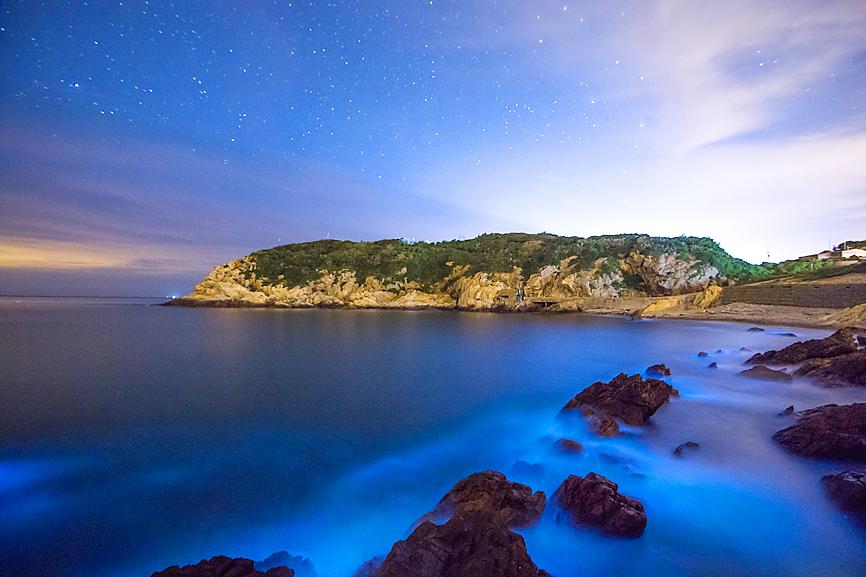Matsu’s “blue tears,” usually visible from April to September, were sighted as late as October this year due to a surprising reason: Chinese dredging, an ecologist said on Thursday.
Illegal dredging near Lienchiang County has kicked up nutrients and phytoplankton from the ocean floor, providing a favorable environment for the bioluminescent algae, also known as sea sparkle, a research team led by National Taiwan Ocean University professor Chiang Kuo-ping (蔣國平) has found.
The Matsu archipelago has in the past few years attracted many tourists who want to experience the blue tears, which have even made a CNN list of the top 15 natural scenic wonders of the world.

Photo courtesy of the Lienchiang County Government
Although sea sparkle might be seen throughout the spring and summer, its appearance relies on a number of criteria, Chiang said.
The algae require warm water ranging from 15°C to 24°C, making the late spring and early summer the optimal viewing time, he said.
However, it does not appear if the moon is too bright, or if the wind, currents, tide or topography is unsuitable, he added.
Research has shown that the bioluminescence is a natural phenomenon that originates in the Min River in China’s Fujian Province, Chiang said.
From April to June every year, runoff from melted snow flows down the swollen Min River, bringing with it inorganic nutrients such as nitrogen, silicon and phosphorus that phytoplankton feeds on, he said.
Of these phytoplankton that multiply with the influx of nutrients, diatoms are a main food source for the algae responsible for blue tears, he added.
The algae reproduce quickly due to this abundance of food, resulting in an algal bloom and the sea sparkle phenomenon, Chiang said.
Once the high-water season ends on the Min River, diatoms become less abundant and the bioluminescent algae fade along with it, he said.
This year, the blue tears were particularly plentiful — even into October — because of the nutrients dredged up from the ocean floor by Chinese vessels, Chiang said.
University president Hsu Tai-wen (許泰文) said that researchers at the school have found ways to cultivate sea sparkle, allowing visitors to view the phenomenon year-round at the Blue Tears Ecological Museum on Matsu’s Nangan Island (南竿).
The university in October established the Matsu Ocean Research Center dedicated to the research of marine environments and related industries, Hsu said.
The center is currently working on developing a smartphone app that would forecast when the blue tears are likely to appear, he added.
Lienchiang County Commissioner Liu Tseng-ying (劉增應) said that it is not easy to catch the blue tears, but if the conditions are right, it is an unforgettable experience.
The county council is working with the university on research and education related to sea sparkle, Liu said, adding that he is looking forward to a future in which visitors would know the right time to catch a glimpse of the blue tears.

Global bodies should stop excluding Taiwan for political reasons, President William Lai (賴清德) told Pope Francis in a letter, adding that he agrees war has no winners. The Vatican is one of only 12 countries to retain formal diplomatic ties with Taiwan, and Taipei has watched with concern efforts by Beijing and the Holy See to improve ties. In October, the Vatican and China extended an accord on the appointment of Catholic bishops in China for four years, pointing to a new level of trust between the two parties. Lai, writing to the pope in response to the pontiff’s message on Jan. 1’s

A Vietnamese migrant worker on Thursday won the NT$12 million (US$383,590) jackpot on a scratch-off lottery ticket she bought from a lottery shop in Changhua County’s Puyan Township (埔鹽), Taiwan Lottery Co said yesterday. The lottery winner, who is in her 30s and married, said she would continue to work in Taiwan and send her winnings to her family in Vietnam to improve their life. More Taiwanese and migrant workers have flocked to the lottery shop on Sec 2 of Jhangshuei Road (彰水路) to share in the luck. The shop owner, surnamed Chen (陳), said that his shop has been open for just

HOLIDAY EXERCISE: National forest recreation areas from north to south offer travelers a wide choice of sights to connect with nature and enjoy its benefits Hiking is a good way to improve one’s health, the Forestry and Nature Conservation Agency said, as it released a list of national forest recreation areas that travelers can visit during the Lunar New Year holiday. Taking a green shower of phytoncides in the woods could boost one’s immunity system and metabolism, agency Director-General Lin Hwa-ching (林華慶) cited a Japanese study as saying. For people visiting northern Taiwan, Lin recommended the Dongyanshan National Forest Recreation Area in Taoyuan’s Fusing District (復興). Once an important plantation in the north, Dongyanshan (東眼山) has a number of historic monuments, he said. The area is broadly covered by

TAKE BREAKS: A woman developed cystitis by refusing to get up to use the bathroom while playing mahjong for fear of disturbing her winning streak, a doctor said People should stand up and move around often while traveling or playing mahjong during the Lunar New Year holiday, as prolonged sitting can lead to cystitis or hemorrhoids, doctors said. Yuan’s General Hospital urologist Lee Tsung-hsi (李宗熹) said that he treated a 63-year-old woman surnamed Chao (趙) who had been sitting motionless and holding off going to the bathroom, increasing her risk of bladder infection. Chao would drink beverages and not urinate for several hours while playing mahjong with friends and family, especially when she was on a winning streak, afraid that using the bathroom would ruin her luck, he said. She had